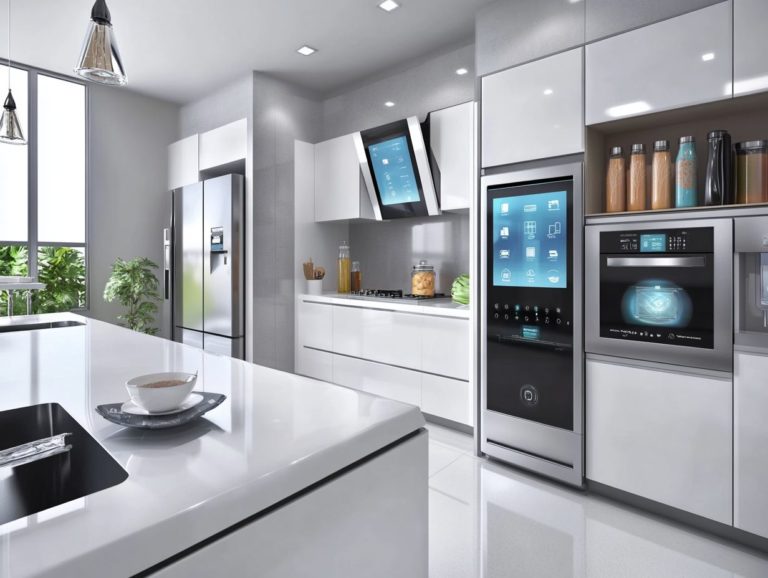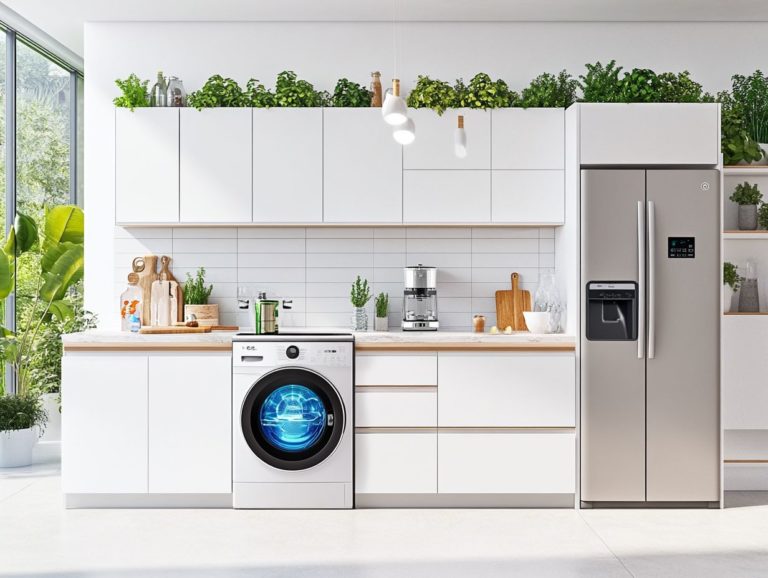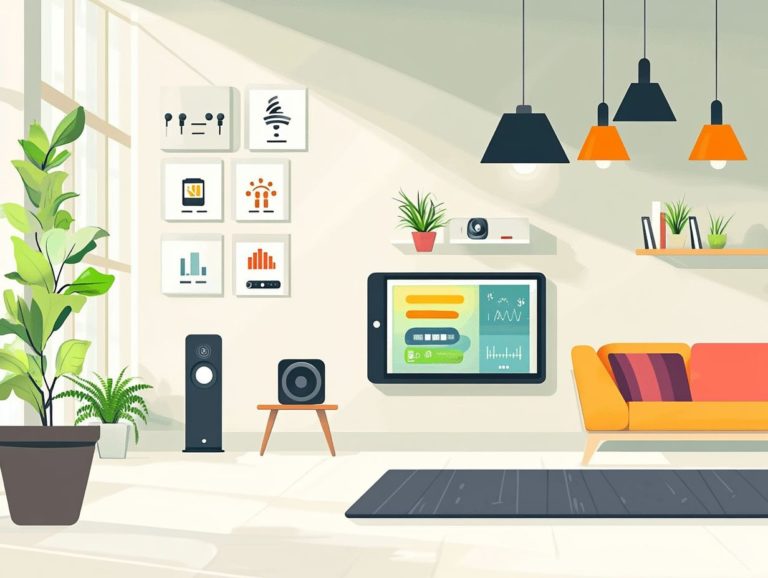Exploring the Benefits of Smart HVAC Systems
In today s tech-savvy landscape, smart HVAC systems are revolutionizing your approach to heating and cooling. They integrate smart home technology for enhanced control and comfort.
These sophisticated systems prioritize energy efficiency, offering cost-effective solutions and significant savings. By using smart sensors, automation, and remote monitoring, they adapt seamlessly to your lifestyle and preferences.
Before you install one, consider compatibility, installation costs, and maintenance alerts.
Don t miss out on the incredible benefits of smart HVAC systems! They can transform your home into a comfort haven while saving you money.
Contents
- Key Takeaways:
- Benefits of Smart HVAC Systems
- How Smart HVAC Systems Work
- Considerations Before Installing a Smart HVAC System
- Frequently Asked Questions
- What are smart HVAC systems?
- How do smart HVAC systems benefit homeowners?
- What are the environmental benefits of using smart HVAC systems?
- Do smart HVAC systems require professional installation?
- Can smart HVAC systems be controlled remotely?
- Are there cost savings associated with using smart HVAC systems?
Key Takeaways:
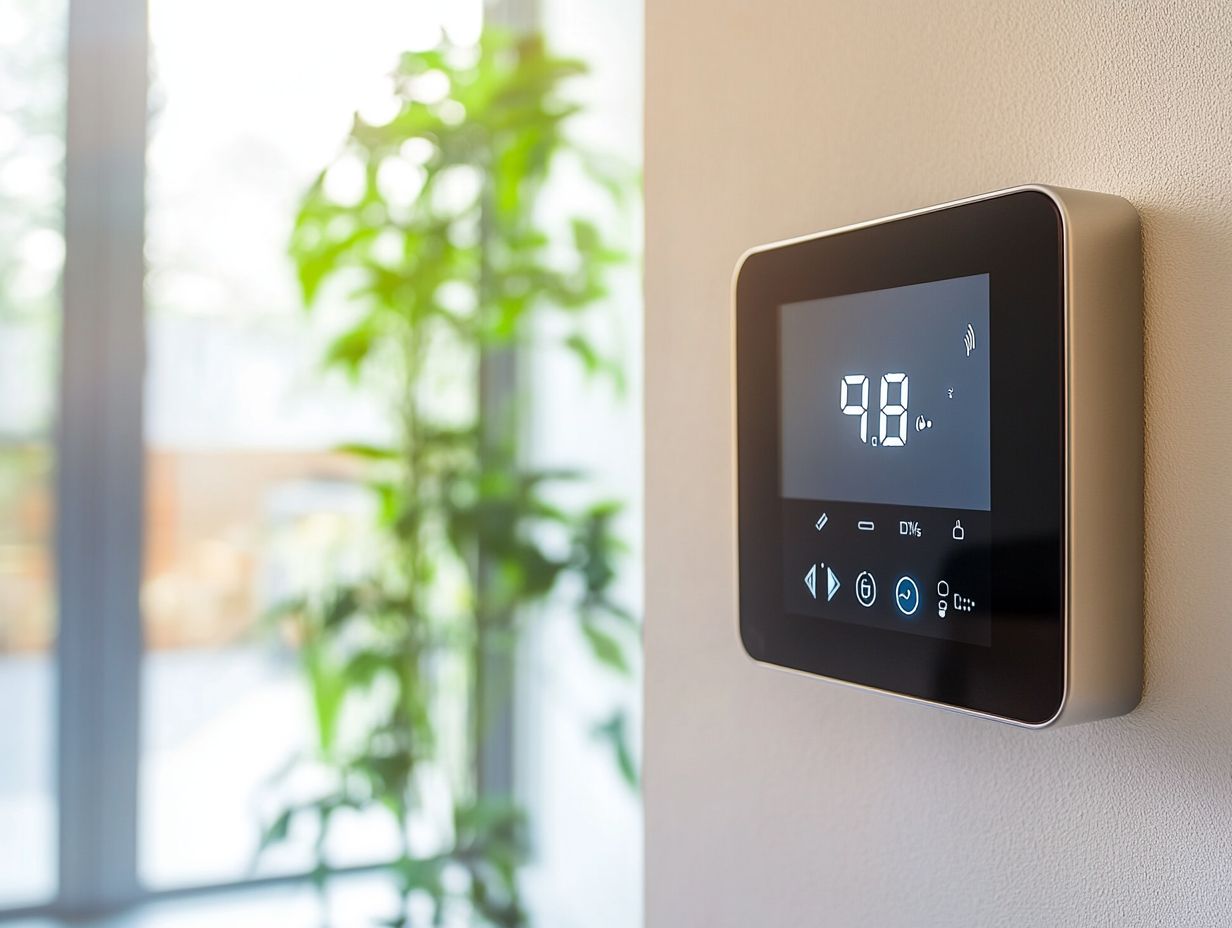
- Smart HVAC systems improve energy efficiency and save you money on utility bills.
- They offer customizable settings and real-time adjustments through a mobile app.
- While installation may cost more, the long-term savings make it a smart investment.
What are Smart HVAC Systems?
Smart HVAC systems are an exciting advancement in heating and cooling technology. They use connected devices and smart algorithms to keep your home comfortable.
These systems feature advanced thermostats and smart sensors that adjust to your preferences. This ensures efficient energy consumption while enhancing your comfort.
By integrating with other smart home technologies, like lighting and security systems, smart HVAC units create a cohesive ecosystem. This elevates convenience, boosts energy efficiency, and enriches overall home automation.
These intelligent systems utilize real-time data analysis and predictive techniques to fine-tune heating and cooling schedules. They learn from your habits and adjust dynamically to maintain ideal conditions.
For example, smart thermostats like the Nest Learning Thermostat link with mobile apps, giving you the power to control your environment from anywhere.
Smart sensors monitor room occupancy and weather changes. This allows the HVAC system to minimize energy waste by scaling output back when it isn t needed.
With features like zoned control and air quality monitoring, these innovations significantly reduce your carbon footprint and improve indoor air quality. They lead to both financial savings and enhanced comfort in your living or working spaces.
Benefits of Smart HVAC Systems
Smart HVAC systems offer a wealth of advantages that elevate your experience and lead to impressive cost savings. They utilize innovative technologies to become critical in modern home automation.
They grant you precise comfort control through features like real-time adjustments based on environmental conditions. Utilizing smart sensors ensures optimal efficiency.
This means you can enjoy automated schedules finely tuned to your preferences, enhancing your overall experience.
By seamlessly integrating with your smart home ecosystem, these HVAC units enhance heating and cooling performance. They also help lower your energy bills, ensuring a comfortable and economical indoor environment.
Upgrade to a smart HVAC system today for a smarter, more comfortable home!
Improved Energy Efficiency
One of the notable features of smart HVAC systems is their remarkable ability to boost energy efficiency, utilizing AI algorithms to optimize performance, leading to substantial savings for both homeowners and businesses.
This impressive capability emerges from advanced technology that effortlessly integrates smart sensors with the analysis of real-time data and wireless communication. For instance, when these systems are detecting if a room is occupied, they intelligently adjust the temperature to ensure comfort while avoiding energy waste in unoccupied spaces.
Many smart HVAC setups utilize machine learning algorithms, or smart systems that learn from your usage patterns, to predict demand based on historical usage patterns. This allows them to optimize performance throughout various times of the day, resulting in enhanced energy savings.
Examples include automatic changes to airflow and custom temperature settings, which can collectively result in energy savings of up to 30%, showcasing the effectiveness of HVAC optimization techniques. These innovative optimization techniques not only enhance efficiency but also contribute to a greener environment by significantly reducing carbon footprints, fostering a sustainable solution for your indoor environment.
Enhanced Comfort and Convenience
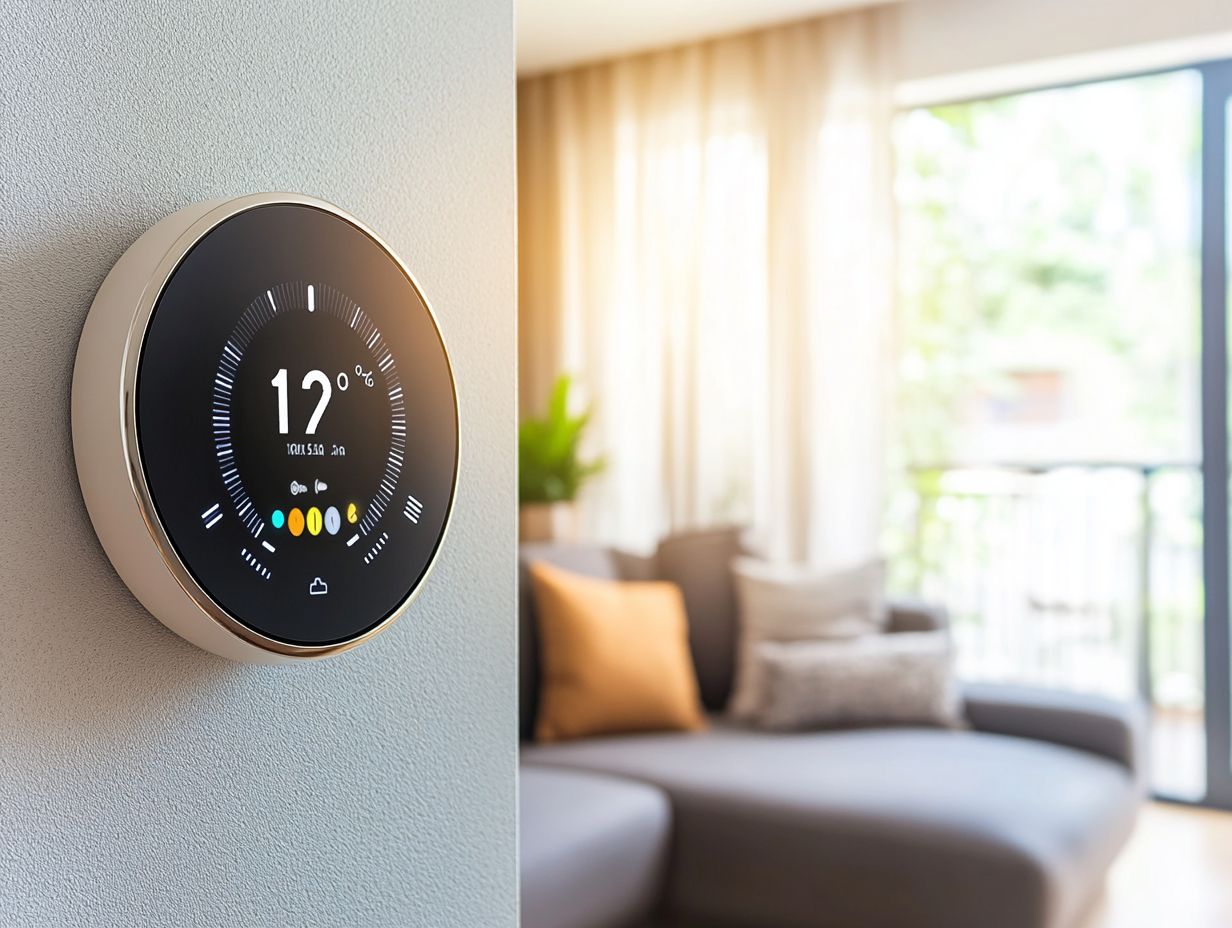
Enhanced comfort and convenience stand out as primary benefits when you implement smart HVAC systems in your residential or commercial space, transforming the way you experience heating and cooling.
These systems give you the power of personalized control, adapting to your preferences and utilizing automated schedules to ensure optimal temperature regulation throughout the day, enhancing your home comfort.
Many users have reported impressive energy savings, as their systems automatically adjust based on occupancy patterns and real-time data analysis. Imagine the peace of mind that comes with remote monitoring through smart devices, allowing you to receive alerts if temperatures fluctuate unexpectedly, enabling timely adjustments even when you re not at home.
Voice command integration with platforms like Amazon Alexa and Google Assistant elevates the operation to a whole new level. Instead of wrestling with a manual thermostat, you can simply ask your smart devices to lower the temperature or turn on the air conditioning, utilizing the smart home ecosystem.
This kind of control not only enhances your comfort but also boosts energy efficiency, making smart HVAC systems a valuable addition to any modern living space while ensuring optimal indoor conditions.
Cost Savings
Smart HVAC systems will save you money over time, primarily by slashing your energy bills and enhancing system efficiency through advanced technology and real-time adjustments.
By integrating intelligent technology that sends you maintenance alerts and usage analytics, these HVAC units help you pinpoint and resolve potential issues before they grow into costly repairs. This ultimately keeps installation and repair costs in check, ensuring the longevity of your smart HVAC system.
The long-term energy savings from adopting smart technology can easily offset the initial investment, making it a financially savvy choice for homeowners like you who are seeking sustainable solutions and efficient HVAC integration.
These advanced systems also optimize energy consumption by adjusting heating and cooling settings based on real-time data and your user preferences. This not only elevates your comfort but also minimizes waste, translating to lower utility expenses and increased energy savings.
Many smart HVAC solutions come packed with features like programmable thermostats and remote monitoring, allowing you to manage your energy usage even when you’re away from home, offering flexibility and control.
Over time, the regular system maintenance prompted by these smart notifications can extend the lifespan of your equipment, maximizing your financial benefits while contributing to a greener footprint through sustainable practices.
Upgrade today and enjoy a more comfortable, energy-efficient home!
How Smart HVAC Systems Work
Understanding the mechanics of smart HVAC (Heating, Ventilation, and Air Conditioning) systems is key to appreciating their many benefits and functionalities, including energy efficiency and cost savings. These sophisticated systems use a blend of advanced sensors, automation technology, and seamless wireless connectivity.
With remote control and monitoring capabilities at your fingertips, you can access real-time data on energy consumption and environmental conditions via your mobile app. This gives you the power to make informed adjustments to your HVAC system, ultimately enhancing both comfort and efficiency in your space.
Sensors and Automation
At the heart of intelligent HVAC systems are sensors and automation technologies that work in perfect harmony to optimize your indoor climate control. Smart sensors monitor environmental conditions and detect occupancy, providing you with real-time data that fuels predictive analysis for temperature regulation and enhances air quality.
These advanced systems automatically adjust based on the presence of individuals, ensuring a comfortable atmosphere while minimizing energy waste.
This feature truly boosts your experience. Various types of sensors are employed, including:
- Temperature sensors that accurately measure indoor warmth and adjust temperature settings for comfort.
- Humidity sensors that maintain optimal moisture levels and contribute to air quality.
- Occupancy sensors that track human presence to adjust settings accordingly, enhancing user experience.
By leveraging automation, these systems boost energy efficiency and seamlessly adapt to changing conditions, such as seasonal weather fluctuations or varying occupancy patterns.
When integrated with smart home systems, these capabilities are amplified, allowing you to monitor and control your environment remotely, ensuring comfort and efficiency are always at your fingertips.
Remote Control and Monitoring
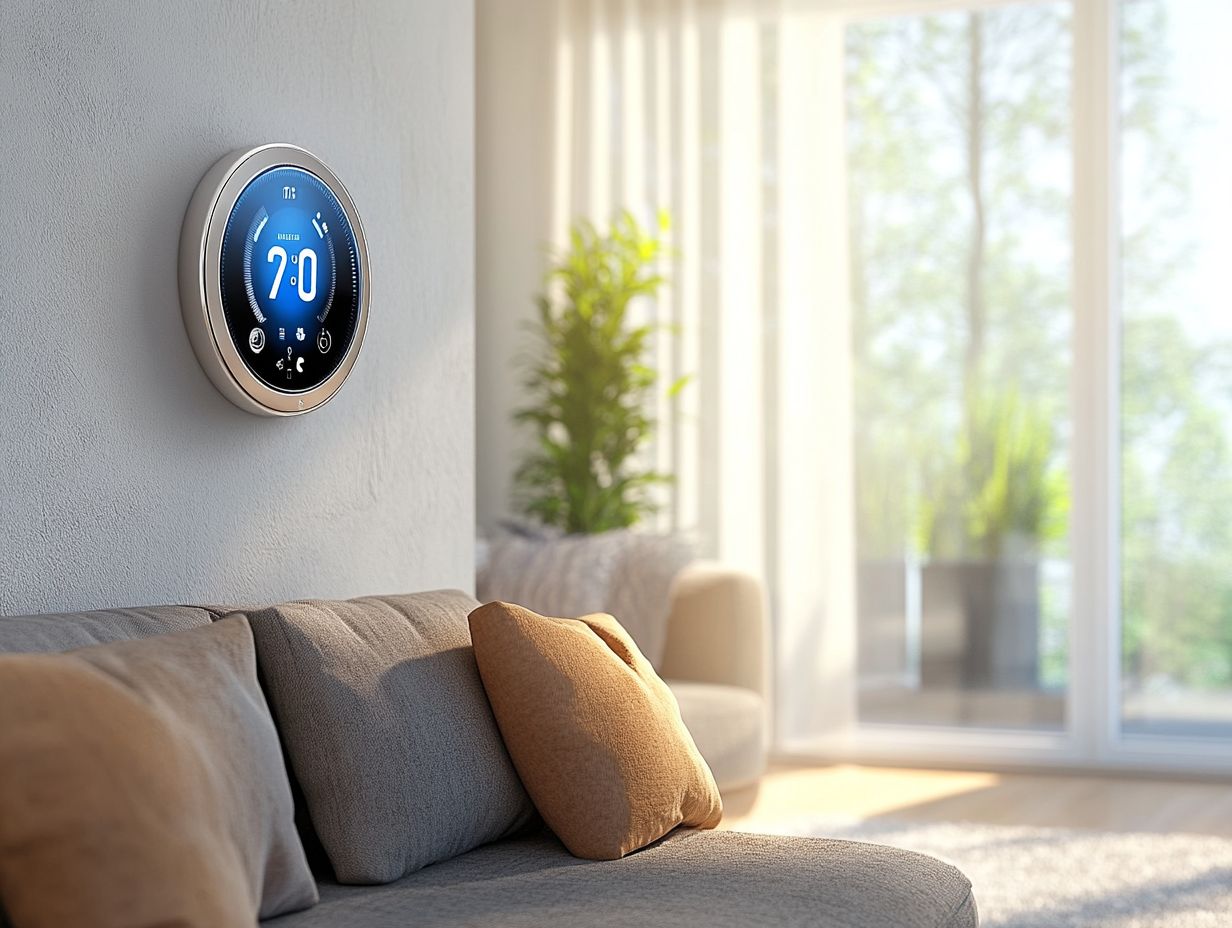
Remote control and monitoring capabilities are fundamental features of smart HVAC systems, offering you unmatched convenience and flexibility through wireless connectivity. With dedicated mobile apps and smart devices, you can access real-time data about your HVAC system’s performance, adjust temperature settings, and monitor energy consumption from virtually anywhere.
This control elevates your experience and boosts energy efficiency, allowing for timely adjustments based on occupancy and environmental conditions.
Today, Wi-Fi and smart thermostats revolutionize how you manage heating and cooling! Apps such as Nest and Ecobee give you the power to set schedules, receive alerts, and seamlessly integrate your HVAC settings with other smart home devices for a unified ecosystem. Voice-controlled assistants like Amazon Alexa and Google Assistant simplify interactions, enabling hands-free management of temperature settings.
As these innovations continue to evolve, the ability to manage HVAC systems remotely not only brings you comfort but also significantly reduces energy costs, making sustainability more attainable than ever. Discover the benefits of smart home systems for energy management and act now to enjoy these savings and comfort!
Considerations Before Installing a Smart HVAC System
Before installing a smart HVAC system, consider several important factors, including installation challenges, to ensure compatibility and optimal performance in your home or commercial space.
Evaluate installation challenges, the costs associated with smart devices, and how well they connect with your existing HVAC infrastructure. These elements greatly influence the overall effectiveness and user experience.
Understand maintenance requirements, including maintenance alerts and potential future upgrade options. This knowledge empowers you to make a well-informed decision about your smart HVAC investment.
Make your home smarter and more efficient by considering these factors before installation!
Compatibility and Integration
When selecting a smart HVAC system, compatibility and integration with your existing setup are important. These elements can significantly impact your system’s performance and efficiency. Check if your HVAC setup works well with smart devices, such as smart thermostats or sensors, to maximize your investment!
Successfully integrating these devices with your home automation system can transform your user experience and offer comprehensive climate control solutions.
Understanding how well your HVAC system meshes with intelligent zoning systems and air quality monitors can further refine energy efficiency and indoor comfort. For more insights, consider exploring smart home automation and energy savings. Evaluate specific components like ductwork, HVAC units, and control interfaces to pinpoint any potential integration hurdles.
For example, smart thermostats from reputable brands like Nest or Ecobee adapt to the unique features of your existing setup, enhancing both efficiency and comfort. Pairing these with smart humidifiers or air purifiers that integrate seamlessly into your current systems boosts air quality and fosters a cohesive environment that s easy to manage.
Ultimately, a thorough evaluation and thoughtful integration of these advanced technologies, including smart lighting solutions, will pave the way for smarter, more responsive HVAC solutions tailored to your needs.
Cost and Maintenance
The cost of installing a smart HVAC system is a key factor to consider, as initial expenses can vary widely based on the technology and features you choose. Smart HVAC systems often have higher installation costs, but they can lead to significant long-term savings through enhanced energy efficiency and lower energy bills.
By understanding maintenance needs, including alerts and service options, you can effectively manage ongoing costs.
Expect varied pricing based on the complexity of the system and your home’s specific installation requirements. Factors like the size of your property, the condition of existing ductwork, and any necessary upgrades will play a crucial role in determining your overall expenses.
It’s also essential to think about the convenience these intelligent systems offer. With remote control capabilities and customizable settings, they enhance your comfort and optimize energy usage. Over time, the gap between upfront costs and your cumulative savings can narrow significantly, making smart HVAC systems a smart investment for anyone looking to reduce their environmental footprint while enjoying modern conveniences.
Frequently Asked Questions
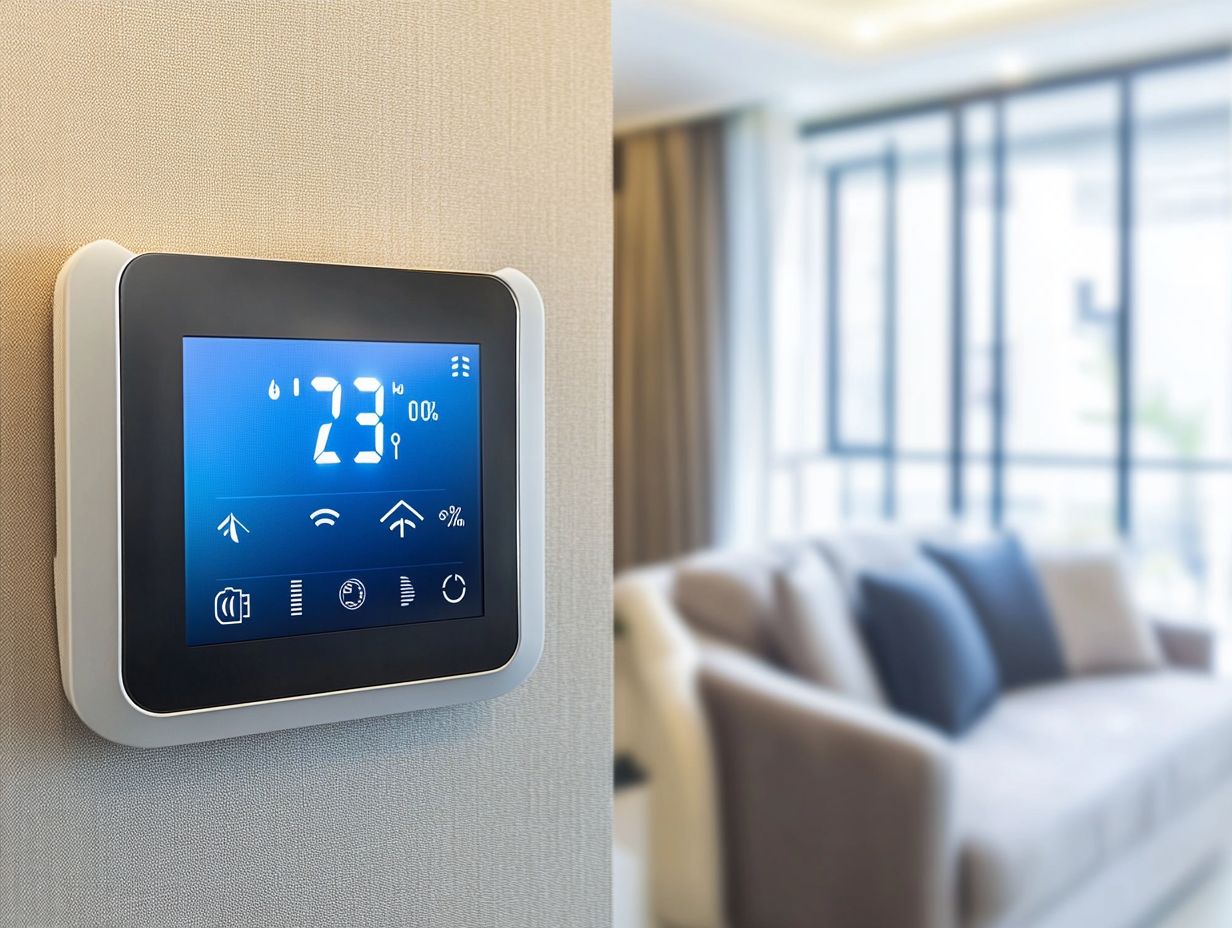
What are smart HVAC systems?
Smart HVAC systems are advanced heating, ventilation, and air conditioning systems that use sensors, algorithms, and remote control capabilities to optimize energy usage and provide efficient, personalized temperature control.
How do smart HVAC systems benefit homeowners?
Smart HVAC systems offer several benefits for homeowners:
- Reduced energy consumption and costs
- Improved indoor air quality
- Convenient and customizable temperature control
What are the environmental benefits of using smart HVAC systems?
Smart HVAC systems can help reduce carbon emissions and environmental impact by using energy more efficiently and decreasing the need for fossil fuels.
Do smart HVAC systems require professional installation?
Yes, smart HVAC systems typically need professional installation for proper setup and functionality. However, some systems may offer DIY installation options for tech-savvy homeowners.
Can smart HVAC systems be controlled remotely?
Yes, most smart HVAC systems come with a mobile app or web interface that allows users to control and monitor their system remotely, providing convenience and flexibility.
Are there cost savings associated with using smart HVAC systems?
Yes, smart HVAC systems can lead to significant cost savings over time, as they use energy more efficiently and may qualify for rebates or tax credits. Monitoring and adjusting the system remotely can prevent unnecessary energy usage and expenses.
Explore your options for smart HVAC systems today! Contact a professional to discuss your needs and get started on your journey to a more efficient home.




